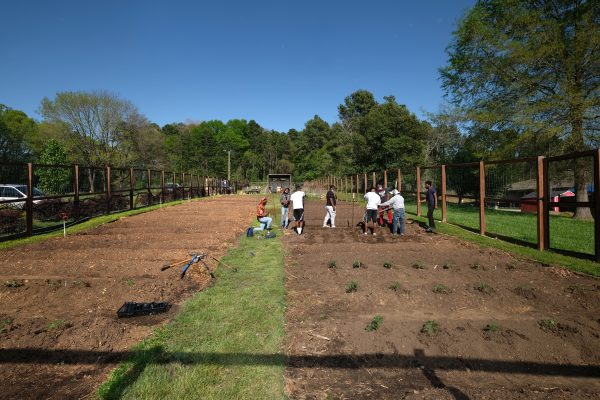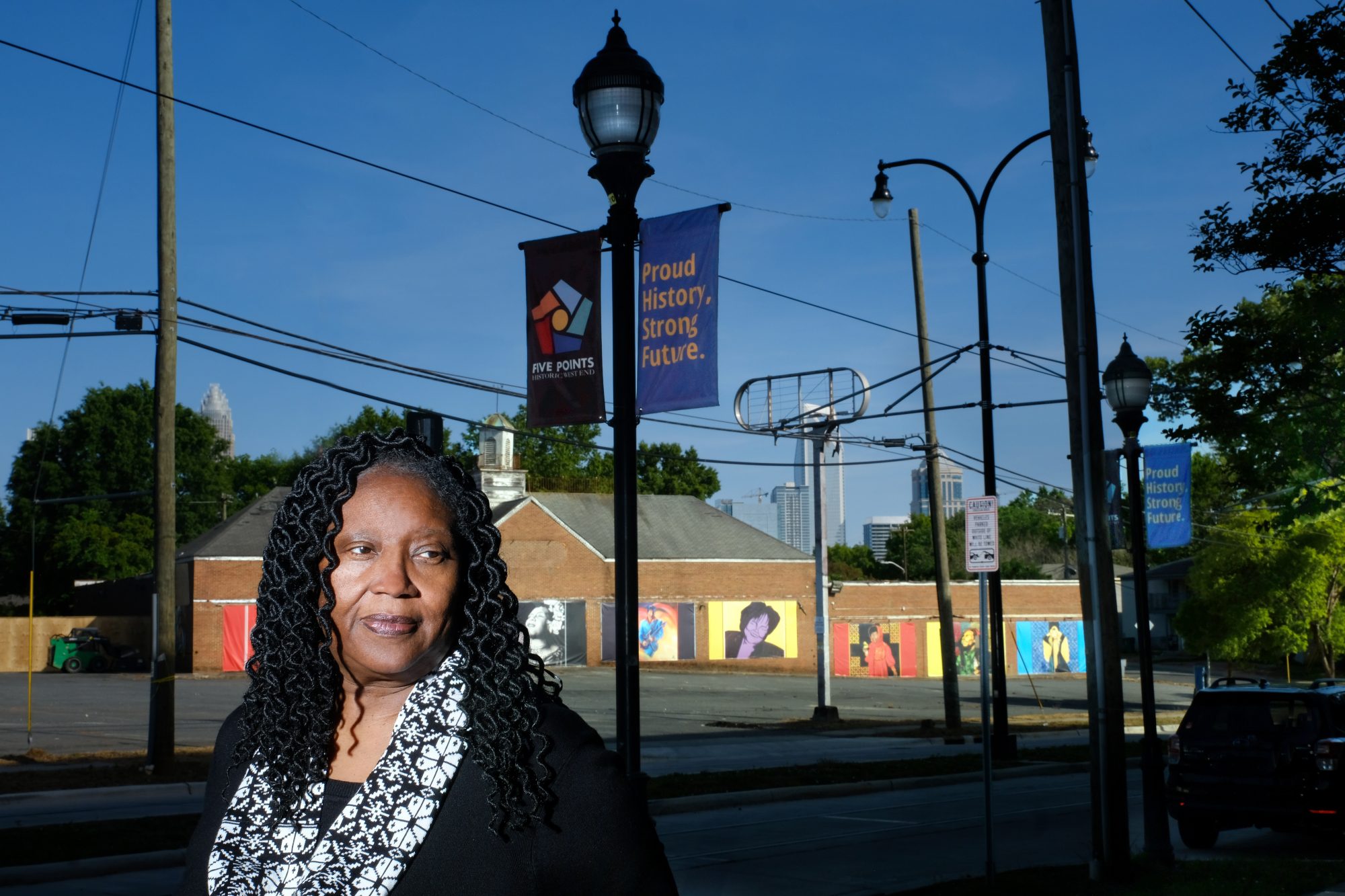‘Fresh food access is a human right’ — Meet some of the people seeking change in West Charlotte

‘Fresh food access is a human right’ — Meet some of the people seeking change in West Charlotte
By Mae Israel
After years of pushing for better food access in West Charlotte neighborhoods, J’Tanya Adams and Rickey Hall have grown weary of broken promises and the failure of most traditional grocers to invest in their predominantly Black communities.
“The need for fresh food hubs exists in many urban corridors,” said Adams, founder and program director of Historic West End Partners, which promotes commercial development along Beatties Ford Road. “Buying groceries through convenience and dollar stores ensures you don’t starve, but does nothing for you nutritionally. It is inexpensive monetarily but a price is being paid in health.”
Both are now leading resident-initiated efforts to open food retail stores.
 “We are tired of waiting and having unfulfilled expectations of market forces,” said Hall, president of the West Boulevard Neighborhood Coalition. “We are creating the means for a grocery store owned by the community, to provide fresh produce and meat and good paying jobs.”
“We are tired of waiting and having unfulfilled expectations of market forces,” said Hall, president of the West Boulevard Neighborhood Coalition. “We are creating the means for a grocery store owned by the community, to provide fresh produce and meat and good paying jobs.”
Hall, who was born in the Reid Park neighborhood off West Boulevard, has never known a food shopping experience rooted in convenience, accessibility and plentiful choices. He has always lived in West Charlotte neighborhoods. When he wants items unavailable in his community, he has to drive somewhere else. Many West Charlotte residents who lack transportation don’t even have that option: They have to take the bus, a journey that can take 90 minutes or more, to a grocery store.
photo by Nancy Pierce
Adams and Hall are now participating in a partnership between residents, the University of North Carolina at Charlotte and Johnson C. Smith University researchers to come up with solutions for increasing healthy food options in West Charlotte. The initiative, called the Community Innovation Incubator, is being facilitated by UNC Charlotte’s Office of Urban Research and Community Engagement. Recommendations will be released by the Community Innovation Incubator in June.
On a recent sunny afternoon, Hall was busily planting tomatoes, cucumbers and other vegetables in a community garden he helped create in 2016 through Seeds for Change, an initiative of the West Boulevard Neighborhood Coalition. Several teenage boys who participate in the garden’s youth leadership and training program, assisted with digging, heaping dirt and watering the young plants.
“The community has been very supportive,” said Hall, adding that his organization also was able last year as a result of grants to donate free food to families suffering during the pandemic.
Eating some of the food that he has helped plant over the past few years, “has felt good,” said Christian Dumas, 18.
Nearly five years ago, Seeds for Change also began a journey toward opening a co-op grocery store at the intersection of West Boulevard and Clanton Road, adjacent to the garden. The effort has involved conducting market research, negotiating land leases, and raising money.
“It’s been a lifelong pursuit,” Hall said. “I believe in the principle that those persons with the problems have the solutions. That doesn’t mean they can be solved without help. There have to be partnerships. The genesis of the solution has to come from within.”
Hall sees the work of the Community Innovation Incubator initiative and it’s harnessing of resources from university researchers, residents, business leaders, county government and others as key to building momentum that could build on the community’s efforts.
“I think it will galvanize greater support for our efforts,” said Hall, who worked for more than three decades with the county Department of Social Services. “This is an effort around community wealth-building that improves the quality of life for the residents.”
There are no grocery stores along West Boulevard, which is classified as a “food desert.” Across much of the West Charlotte area, which generally stretches in an arc from Beatties Ford Road south to West Boulevard, full-service grocery stores are sparsely located.
Along the nearly nine-mile stretch of Beatties Ford Road from West Trade Street near uptown Charlotte to Sunset Road, there is one grocery store located in the commercial heart of the corridor. Two others are near the edge of the corridor, along Sunset Road closer to Huntersville.
“Fresh food access is a human right,” said Adams. “Those who have perpetual access take it for granted.”
Adams’ organization, the nearly 12-year-old Historic West End Partners, has been selected as the host organization to participate in a city of Charlotte partnership with the nonprofit National Main Street Center, which will work with residents to reimagine the commercial area at Beatties Ford Road and LaSalle Street.
As part of the effort, a market study will be conducted to determine what other fresh food options would be feasible in the area, Adams said. A few years ago, she began investigating the possibility of opening a co-op market.
Adams understands what it means to persevere to achieve a goal, and she has used her tenacity to help her neighborhood.
A single mother of two sons, Adams lived in subsidized housing as she completed community college. She later was hired for a job in information technology, where she spent much of her career. photo by Nancy Pierce
She bought a house in Seversville, a neighborhood near Johnson C. Smith now undergoing gentrification.
As a self-described connector, Adams has served as a booster for Beatties Ford Road, constantly selling its potential and possibilities to government officials, business leaders, investors and others.
Among many efforts, Adams actively supported an investor who renovated a commercial center opening across from the university at Beatties Ford Road and Rozzelles Ferry Road. It is opening soon with several Black-owned businesses.
“You have to see the opportunity and cultivate it,” said Adams. “I have multiple initiatives that people say they want. The doors and windows are opening and closing. I run at them before they close. I apply a lot of biblical principles to what I do. They are tried and true and I stick with them.”
Adams, like Hall, said she is optimistic about the outcome of the Community Innovation Incubator initiative and thinks the multi-faceted strategy will strengthen existing efforts by residents to improve healthy food access.
“I think it will not only amplify but attract the right mix of connections,” she said.
“This is the opportunity,” Hall added, “to do it right.”